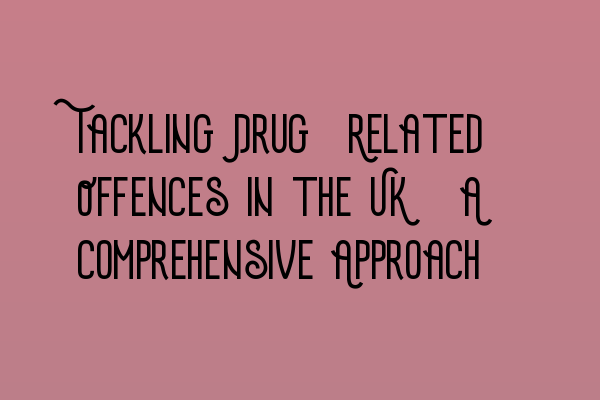Tackling Drug-Related Offences in the UK:
A Comprehensive Approach
Drug-related offences have been a persistent challenge in the UK, with serious implications for public health and safety. The illegal drug trade not only fuels criminal activity but also contributes to social degradation and economic burden. To effectively combat this menace, it is imperative to adopt a comprehensive approach that combines legal measures, enforcement strategies, and rehabilitative interventions. This blog post aims to shed light on the multifaceted efforts being undertaken in the UK to tackle drug-related offences and provides insights into the importance of a comprehensive approach.
The legal framework surrounding drug-related offences in the UK is primarily governed by the Misuse of Drugs Act 1971. This legislation classifies drugs into different categories, or classes, based on their potential harm and misuse. Class A drugs, such as heroin and cocaine, are considered the most harmful and carry the most severe penalties. Class B drugs, including cannabis and amphetamines, carry lesser penalties, while Class C drugs, like anabolic steroids, generally attract even lower penalties.
Law enforcement agencies play a pivotal role in tackling drug-related offences. Police forces across the UK employ various strategies to disrupt drug supply chains, dismantle organized criminal networks, and apprehend offenders. These strategies include targeted intelligence-led operations, proactive undercover work, and collaboration with international agencies to combat drug trafficking. Additionally, the Proceeds of Crime Act 2002 empowers law enforcement to seize and confiscate assets derived from drug-related activities, further discouraging the drug trade.
An effective strategy to combat drug-related offences must include prevention and education initiatives that discourage drug use and promote healthy lifestyles. This involves engaging young people through comprehensive drug education programs, highlighting the dangers of substance abuse, and promoting alternative recreational activities. Additionally, partnerships between communities, schools, and law enforcement agencies are essential in creating a united front against drug misuse.
While enforcement efforts are crucial, it is equally important to address the root causes of drug-related offences. Rehabilitation and treatment programs play a vital role in providing offenders with the necessary support and guidance to break free from the cycle of addiction and criminal behavior. These programs encompass a range of services, including detoxification, counseling, and employment support, aimed at reintegrating individuals back into society.
Drug-related offences are not limited by borders, making international cooperation a critical component of any comprehensive approach. The UK works closely with international partners, such as the United Nations Office on Drugs and Crime (UNODC) and the European Monitoring Centre for Drugs and Drug Addiction (EMCDDA), to exchange information, share best practices, and collectively combat drug trafficking on a global scale. Collaborative efforts are necessary to disrupt international drug markets and prevent drug importation.
As drug-related offences continue to evolve and adapt, so must our strategies for tackling them. A truly comprehensive approach requires ongoing evaluation and adaptation to keep pace with changing trends and emerging substances. Additionally, continued investment in law enforcement capabilities, prevention programs, and treatment services is crucial for long-term success. By addressing the supply chain, educating the public, providing rehabilitation support, and fostering international cooperation, we can make significant strides in combating drug-related offences and building safer communities.
Tackling drug-related offences in the UK necessitates a comprehensive approach that encompasses legal measures, enforcement strategies, prevention initiatives, rehabilitation programs, and international cooperation. By integrating these various components, we create a stronger defense against the pernicious effects of drug abuse and foster a safer society. It is through collective efforts, commitment, and a focus on evidence-based practices that we can hope to reduce drug-related offences and provide individuals with a chance for a brighter future.
